【2018-2019】毕业生沦为“蚁族”的全过程-优秀word范文 (4页)
大学生蜗居蚁族鼠族的看法作文
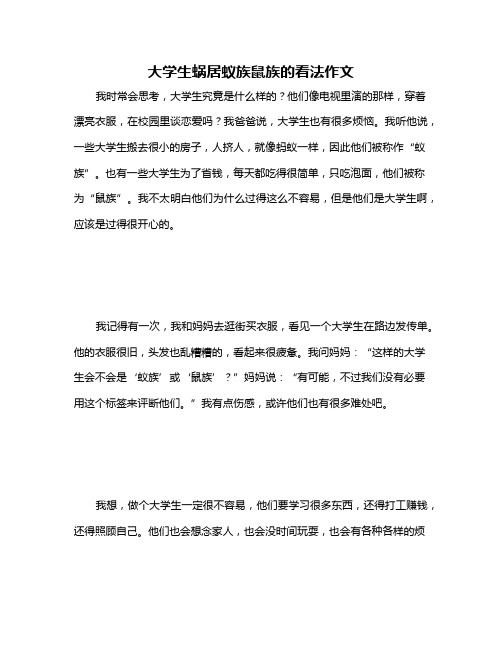
大学生蜗居蚁族鼠族的看法作文
我时常会思考,大学生究竟是什么样的?他们像电视里演的那样,穿着漂亮衣服,在校园里谈恋爱吗?我爸爸说,大学生也有很多烦恼。
我听他说,一些大学生搬去很小的房子,人挤人,就像蚂蚁一样,因此他们被称作“蚁族”。
也有一些大学生为了省钱,每天都吃得很简单,只吃泡面,他们被称为“鼠族”。
我不太明白他们为什么过得这么不容易,但是他们是大学生啊,应该是过得很开心的。
我记得有一次,我和妈妈去逛街买衣服,看见一个大学生在路边发传单。
他的衣服很旧,头发也乱糟糟的,看起来很疲惫。
我问妈妈:“这样的大学生会不会是‘蚁族’或‘鼠族’?”妈妈说:“有可能,不过我们没有必要用这个标签来评断他们。
”我有点伤感,或许他们也有很多难处吧。
我想,做个大学生一定很不容易,他们要学习很多东西,还得打工赚钱,还得照顾自己。
他们也会想念家人,也会没时间玩耍,也会有各种各样的烦
心事。
我突然间觉得,也许他们和我们一样,都是普通人,只是在不同的阶段,经历着有所差别的生活。
有一天,我看见新闻说,有些大学生为了省钱,一边学习一边做兼职,要么给别人送外卖,要么在咖啡店打工。
我觉得他们真的很厉害,既可以自己赚钱,又能帮助别人。
我开始认真思考,即使我慢慢长大,不一定能成为大学生,但我一定要像他们一样努力,做一个有梦想的人。
我以后也要努力学习,做一个像他们一样优秀的人!即使生活很不容易,也要坚强面对现实,不要轻易放弃梦想。
蚁族生活囧状蚁族社会问题
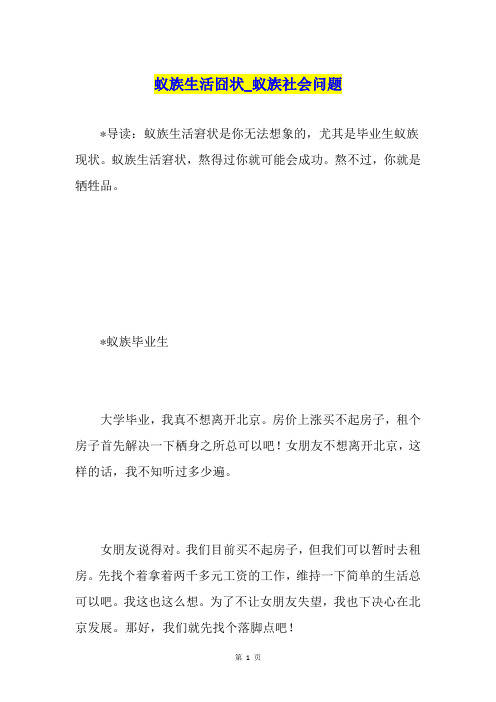
蚁族生活囧状_蚁族社会问题*导读:蚁族生活窘状是你无法想象的,尤其是毕业生蚁族现状。
蚁族生活窘状,熬得过你就可能会成功。
熬不过,你就是牺牲品。
*蚁族毕业生大学毕业,我真不想离开北京。
房价上涨买不起房子,租个房子首先解决一下栖身之所总可以吧!女朋友不想离开北京,这样的话,我不知听过多少遍。
女朋友说得对。
我们目前买不起房子,但我们可以暂时去租房。
先找个着拿着两千多元工资的工作,维持一下简单的生活总可以吧。
我这也这么想。
为了不让女朋友失望,我也下决心在北京发展。
那好,我们就先找个落脚点吧!听一位学兄说,今年上半年,北京房租价格同比上涨超过20%到60%。
据他所知,唐家岭的房租比较便宜,但唐家岭的搬迁改造工作已经启动。
中关村房子租金每月只有27元/每平方米,租60平米房子,租金也只有720元。
想起学兄的话,我和女朋友决定到中关村去看一看,渴望在那里寻找到好运气和我们心中的愿望。
走进中关村,大批房屋租赁广告随处可见。
但是租金价格不是学兄说的那样,我所走过的地方,这里最低的价格也要32.5元/每平方米。
一位房东告诉我,她的房子只有80平米的房子,租金每月2600元,如果我们需要租的话,必须一次性付清一年的租金。
说实在话,这套房子既简陋又破旧,里面只有一张木板搭成的小床铺。
我和女朋友都没有看上眼,何况我们一次性也拿不出这么多钱。
不过,这房子离中关村第二小学确实比较近,有小孩的年轻夫妇租住这套房子,应该说还是一个不错的选择。
女朋友说,北京的城市这么多大,我就不相信没有我们的容身之地。
我和女朋友的想法一样。
听说马连洼那里的房租很便宜,我们考虑到目前的经济能力,便决定在距离市中心30多公里的马连洼租用个房子。
来到马连洼一家房屋中介,这里还真的很热闹。
七八个人在那里2500元、3000元、3500元地交涉着。
我们看了房,就可以签一年的合同,至于租金你不必担心。
一套喊价2500的房子最后被抬高到3400元。
一开始我还以为他们也是租房的。
浅析“蚁族”现象

浅析“蚁族”现象“蚁族”是一个鲜为人知的庞大群体——大学毕业生低收入聚居群体,具有高知、弱势、低收入、聚居生活、不被关注等特征,主要聚居于城乡结合部或近郊农村。
其日益壮大的队伍引起了社会的充分关注与重视。
本文通过分析“蚁族”的生存现状及其产生原因,提出一些可行的解决方案。
一、“蚁族”的生存现状“蚁族”生活条件差、缺乏社会保障、思想情绪波动较大,挫折感、焦虑感等心理问题较为严重。
他们怀揣梦想,可微薄的薪水,勉强度日的生活现状让他们无所适从,自我认同与社会认同的断裂让他们不知所措。
1.“蚁族”的物质生活“有工作,没生活。
”、“生存之上、生活之下”这似乎是对“蚁族”群体最确切的概括。
据调查研究显示,“蚁族”多从事简单的技术类和服务类工作,如保险推销、电子器材销售和餐饮服务等低层次、低收入、临时性的工作,绝大多数群体成员没有“三险”和劳动合同,有的甚至处于失业、半失业状态,靠家里接济度日。
该群体成员收入的70%以上用于支付房租与承担基本生活保障,其“恩格尔系数”远远高于国内平均标准。
“蚁族”没有固定的居所,他们是“漂流”一族,随时可能被房东“扫地出门”。
2010年,北京“蚁族”的主要聚居区——北京市唐家岭村面临拆迁,大约5万唐家岭租客不得不另觅他处。
他们被灯红酒绿、纷繁多彩的城市生活所围绕,忙碌了几多个春夏却依然无法跻身其中;他们身处一个欲望泛滥的世界,却深陷可望而不可得的窘困境地。
2.“蚁族”的心理状况“蚁族”的总体心理健康水平低于全国平均水平,消极完美主义特质明显。
他们面对从“天之骄子”到“劳动力产品”的巨大落差,教育体制与市场需求的脱节使得他们不得不与农民工、城镇下岗工人竞争同一个职位;他们面对自身刻苦奋斗却得不到仅依靠父辈权力、人脉即可获得好工作的社会现实,没有“硬”关系,在与富二代不公平的竞争中他们败下阵来。
一直坚信“知识改变命运”的他们,面对就业的挫折,生活的失落,产生了对前途对生存的迷茫。
如何看待大学生蚁族到鼠族现象写一篇作文
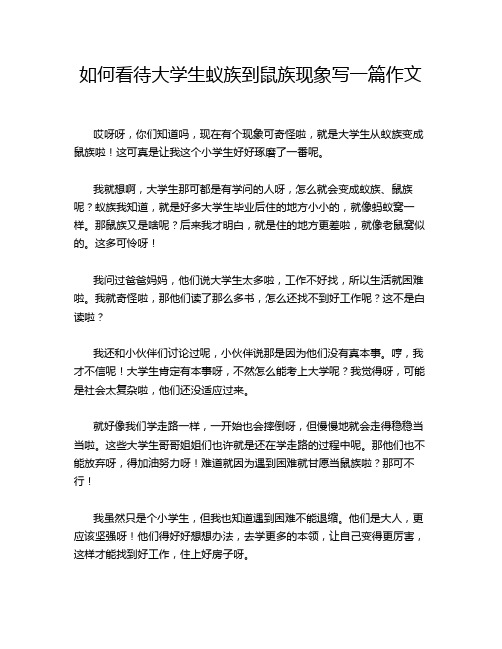
如何看待大学生蚁族到鼠族现象写一篇作文
哎呀呀,你们知道吗,现在有个现象可奇怪啦,就是大学生从蚁族变成鼠族啦!这可真是让我这个小学生好好琢磨了一番呢。
我就想啊,大学生那可都是有学问的人呀,怎么就会变成蚁族、鼠族呢?蚁族我知道,就是好多大学生毕业后住的地方小小的,就像蚂蚁窝一样。
那鼠族又是啥呢?后来我才明白,就是住的地方更差啦,就像老鼠窝似的。
这多可怜呀!
我问过爸爸妈妈,他们说大学生太多啦,工作不好找,所以生活就困难啦。
我就奇怪啦,那他们读了那么多书,怎么还找不到好工作呢?这不是白读啦?
我还和小伙伴们讨论过呢,小伙伴说那是因为他们没有真本事。
哼,我才不信呢!大学生肯定有本事呀,不然怎么能考上大学呢?我觉得呀,可能是社会太复杂啦,他们还没适应过来。
就好像我们学走路一样,一开始也会摔倒呀,但慢慢地就会走得稳稳当当啦。
这些大学生哥哥姐姐们也许就是还在学走路的过程中呢。
那他们也不能放弃呀,得加油努力呀!难道就因为遇到困难就甘愿当鼠族啦?那可不行!
我虽然只是个小学生,但我也知道遇到困难不能退缩。
他们是大人,更应该坚强呀!他们得好好想想办法,去学更多的本领,让自己变得更厉害,这样才能找到好工作,住上好房子呀。
我相信,只要他们不放弃,总会有出路的。
他们不能像小老鼠一样一直躲在角落里呀,得勇敢地冲出来,去面对困难,去战胜困难!这就是我对大学生蚁族到鼠族现象的看法,我觉得他们一定能行!。
《蚁族:大学毕业生聚居村实录》读后感

参考文献:廉思,《蚁族--大学毕业生聚居村实录》
网页:中国经济网,《大学生蚁族们的青春何处安放》
中新网,《蚁族是个伪概念》
郑州日报,《蚁族与向下的青春》
大洋网,《蚁族生存现状调查:多为穷二代有家难回》
重庆日报,《重庆蚁族纷纷晒经历 网友称扩招是蚁族重要成因》
,他们受到的教育就是成功的。纵观社会,排除掉一些大学生凭借关系获得了工作,还是存在很多人,是完全凭借自己的努力获得成功。我的高中同学的父母就是一个例子:她的爸爸毕业于一个普通的大学,妈妈亦是。家里在县城,却白手起家,辛苦之后终于将公司步入正轨。由此看来,教育并非是导致蚁族产生的主要原因。以前,在分配工作的年代,学生们学的东西无关紧要,只要考试过关就行。但是,随着高校市场化改制以后,学生们要学的东西首先要适应市场的要求。对多数大学生来讲,那些学科理论都是虚的,好像学了没什么用处
即便这样,他们还希望能实现自己的梦想--有一套属于自己的干净舒适的房子,有体面的工作,开自己的公司不再为老板打工。但是现实离梦想,不只是一步之遥。
他们是谁?他们就是近几年社会上出现的一种新群体--蚁族。"蚁族",并不是生物学中的一种昆虫种族名词,而是"80后"一个鲜为人知的庞大大学毕业生群体--"蚁族",是对"大学毕业生低收入群聚居集体"的典型的一种概括。他们被人们称为继农民、农民工、下岗工人之后出现在中国的又一大群体。之所以把这个群体形象地称为"蚁族",是因为该群体和蚂蚁有诸多类似的特点:他们高智、他们弱小、他们群居。他们接受了高等教育,他们从事临时性工作甚至处于失业或半失业状态,他们平均月收入低于2000元,他们在北京、上海、广州、武汉、西安等高校云集的大中城市的城乡接合部聚居,他们年龄集中在22-29岁,他们大部分大学毕业3年,他们的居住环境通常是面积狭小、租金低廉、卫生条件差、安全隐患大的出租屋。他们在全国可能超过100万。"蚁族"这个名词由北京大学博士后、青年学者廉思主编的《蚁族--大学毕业生聚居村实录》一书而来。本书被北京市委提交中央后,即刻受到了中央对这类群体的高度重视。在此,笔者就这一热点社会现象,谈谈个人看法。
大学毕业生“蚁族”现象的成因及对策:理性人假设的视角
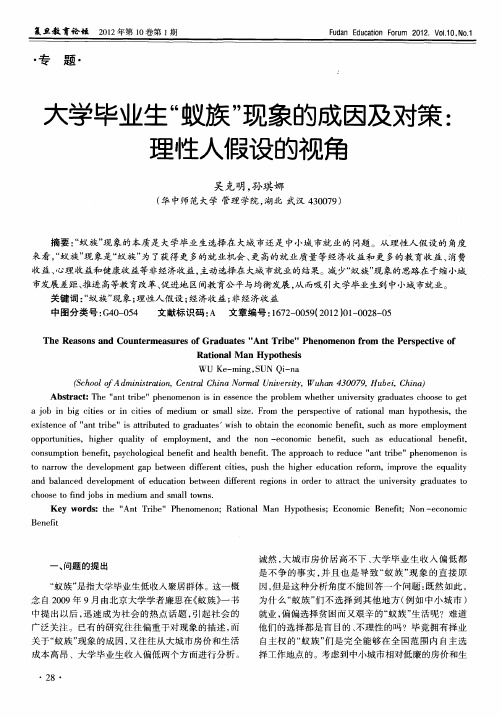
wU K — ig S N Q — a e m n .U iH (c olfAd n t t n C nrl hn oma U ies y S ho i r i , e t iaN r l nv r t o mi s a o aC i ,Wu a 3 0 9 Hu e C ia h n4 0 7 , b i hn ) ,
Abs r t he” ntti ”ph n me o si s e e t e p o l m e h ru v r i r d a e h o e t e t ac :T a rbe e o n n i n e s nc h r b e wh t e nie st g a u t sc o s o g t y
c os n b e im a ds l t n. hoet f dj s nm du n ma w s oi o i lo
Ke r :t e ” t Trb ” P no n n y wo ds h An i e he me o ;Rai n l t a Ma Hy o h ss o n p t e i;Ec n mi Be e t oo c n f ;No e o mi i n— c no c
专题Βιβλιοθήκη 大学毕业生 “ 蚁族 ” 象的成因及对策 现
●
●
理性人假设 的视角
吴 克 明 , 琪 娜 孙
( 中师 范 大学 管理 学 院 , 北 武汉 40 7 ) 华 湖 3 09
摘 要 :蚁 族 ” 象的本 质是 大学毕 业 生选择在 大城 市还 是 中小城 市就 业 的 问题 。从 理 性人 假 设 的 角度 “ 现 来看 ,蚁 族 ” 象是 “ 族 ” 了获得 更 多的就 业机 会 、 高 的就 业质 量 等经 济收 益 和更 多的教 育 收益 、 费 “ 现 蚁 为 更 消 收益、 心理 收益 和健康收 益等非 经济收益 , 动选择在 大城 市就 业的结果 。减 少“ 主 蚁族 ” 象的 思路 在 于缩 小城 现 市发展 差距 、 进 高等教 育改革、 进地 区 间教 育公 平与均衡发 展 , 而吸 引大学毕业 生到 中小城 市就业 。 推 促 从
大学生关于蚁族的毛概论文
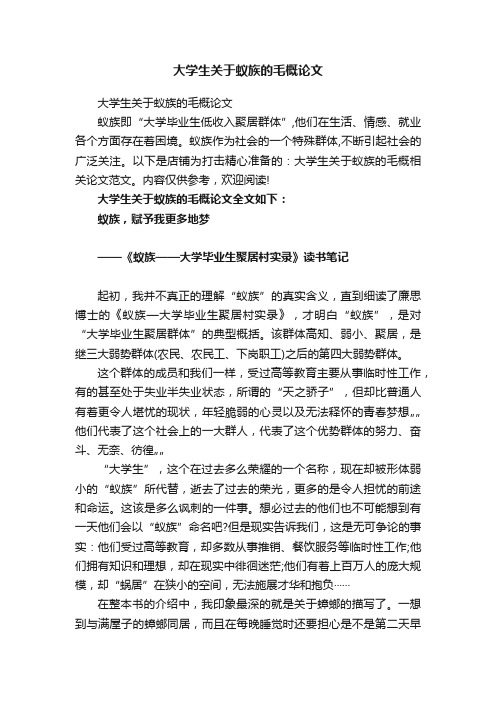
大学生关于蚁族的毛概论文大学生关于蚁族的毛概论文蚁族即“大学毕业生低收入聚居群体”,他们在生活、情感、就业各个方面存在着困境。
蚁族作为社会的一个特殊群体,不断引起社会的广泛关注。
以下是店铺为打击精心准备的:大学生关于蚁族的毛概相关论文范文。
内容仅供参考,欢迎阅读!大学生关于蚁族的毛概论文全文如下:蚁族,赋予我更多地梦——《蚁族——大学毕业生聚居村实录》读书笔记起初,我并不真正的理解“蚁族”的真实含义,直到细读了廉思博士的《蚁族—大学毕业生聚居村实录》,才明白“蚁族”,是对“大学毕业生聚居群体”的典型概括。
该群体高知、弱小、聚居,是继三大弱势群体(农民、农民工、下岗职工)之后的第四大弱势群体。
这个群体的成员和我们一样,受过高等教育主要从事临时性工作,有的甚至处于失业半失业状态,所谓的“天之骄子”,但却比普通人有着更令人堪忧的现状,年轻脆弱的心灵以及无法释怀的青春梦想……他们代表了这个社会上的一大群人,代表了这个优势群体的努力、奋斗、无奈、彷徨……“大学生”,这个在过去多么荣耀的一个名称,现在却被形体弱小的“蚁族”所代替,逝去了过去的荣光,更多的是令人担忧的前途和命运。
这该是多么讽刺的一件事。
想必过去的他们也不可能想到有一天他们会以“蚁族”命名吧?但是现实告诉我们,这是无可争论的事实:他们受过高等教育,却多数从事推销、餐饮服务等临时性工作;他们拥有知识和理想,却在现实中徘徊迷茫;他们有着上百万人的庞大规模,却“蜗居”在狭小的空间,无法施展才华和抱负······在整本书的介绍中,我印象最深的就是关于蟑螂的描写了。
一想到与满屋子的蟑螂同居,而且在每晚睡觉时还要担心是不是第二天早上醒来时会发现有蟑螂钻进了自己的鼻孔,我就觉得毛骨悚然,但是他们却已经习以为常,不是因为不介意才习惯,只是因为没办法才去学着习惯。
细读完这本书,让我深深地感受到了“蚁族”生存环境的艰苦——这些离开家乡,迁入北京农村的蚂蚁从来不曾顾忌前方会是什么,它只顾低头往前走着,认认真真,一丝不苟,在沙地上留下一串或规整或歪斜的痕迹。
我在日本当“蚁族”
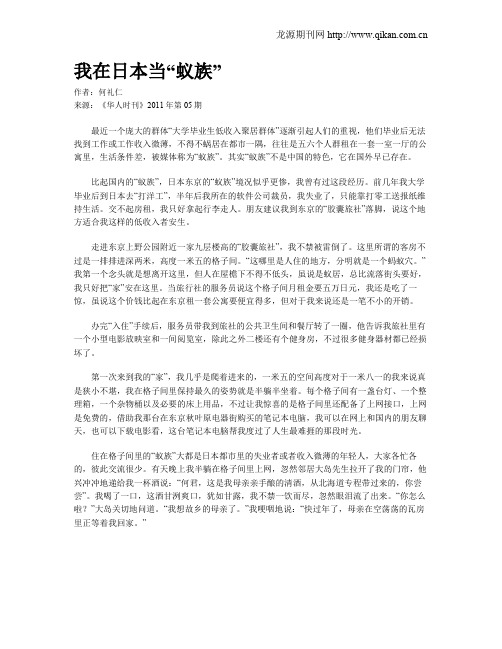
龙源期刊网 我在日本当“蚁族”作者:何礼仁来源:《华人时刊》2011年第05期最近一个庞大的群体“大学毕业生低收入聚居群体”逐渐引起人们的重视,他们毕业后无法找到工作或工作收入微薄,不得不蜗居在都市一隅,往往是五六个人群租在一套一室一厅的公寓里,生活条件差,被媒体称为“蚁族”。
其实“蚁族”不是中国的特色,它在国外早已存在。
比起国内的“蚁族”,日本东京的“蚁族”境况似乎更惨,我曾有过这段经历。
前几年我大学毕业后到日本去“打洋工”,半年后我所在的软件公司裁员,我失业了,只能靠打零工送报纸维持生活。
交不起房租,我只好拿起行李走人。
朋友建议我到东京的“胶囊旅社”落脚,说这个地方适合我这样的低收入者安生。
走进东京上野公园附近一家九层楼高的“胶囊旅社”,我不禁被雷倒了。
这里所谓的客房不过是一排排进深两米,高度一米五的格子间。
“这哪里是人住的地方,分明就是一个蚂蚁穴。
”我第一个念头就是想离开这里,但人在屋檐下不得不低头,虽说是蚁居,总比流落街头要好,我只好把“家”安在这里。
当旅行社的服务员说这个格子间月租金要五万日元,我还是吃了一惊,虽说这个价钱比起在东京租一套公寓要便宜得多,但对于我来说还是一笔不小的开销。
办完“入住”手续后,服务员带我到旅社的公共卫生间和餐厅转了一圈,他告诉我旅社里有一个小型电影放映室和一间阅览室,除此之外二楼还有个健身房,不过很多健身器材都已经损坏了。
第一次来到我的“家”,我几乎是爬着进来的,一米五的空间高度对于一米八一的我来说真是狭小不堪,我在格子间里保持最久的姿势就是半躺半坐着。
每个格子间有一盏台灯、一个整理箱,一个杂物桶以及必要的床上用品,不过让我惊喜的是格子间里还配备了上网接口,上网是免费的,借助我那台在东京秋叶原电器街购买的笔记本电脑,我可以在网上和国内的朋友聊天,也可以下载电影看,这台笔记本电脑帮我度过了人生最难捱的那段时光。
住在格子间里的“蚁族”大都是日本都市里的失业者或者收入微薄的年轻人,大家各忙各的,彼此交流很少。
蚁族的生活
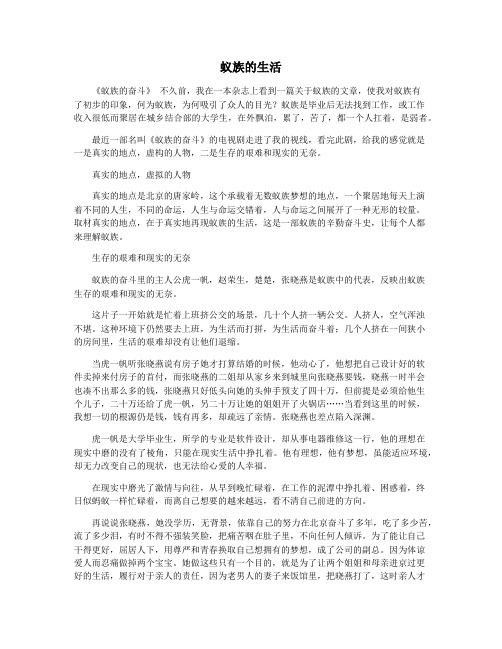
蚁族的生活《蚁族的奋斗》不久前,我在一本杂志上看到一篇关于蚁族的文章,使我对蚁族有了初步的印象,何为蚁族,为何吸引了众人的目光?蚁族是毕业后无法找到工作,或工作收入很低而聚居在城乡结合部的大学生,在外飘泊,累了,苦了,都一个人扛着,是弱者。
最近一部名叫《蚁族的奋斗》的电视剧走进了我的视线,看完此剧,给我的感觉就是一是真实的地点,虚构的人物,二是生存的艰难和现实的无奈。
真实的地点,虚拟的人物真实的地点是北京的唐家岭,这个承载着无数蚁族梦想的地点,一个聚居地每天上演着不同的人生,不同的命运,人生与命运交错着,人与命运之间展开了一种无形的较量。
取材真实的地点,在于真实地再现蚁族的生活,这是一部蚁族的辛勤奋斗史,让每个人都来理解蚁族。
生存的艰难和现实的无奈蚁族的奋斗里的主人公虎一帆,赵荣生,楚楚,张晓燕是蚁族中的代表,反映出蚁族生存的艰难和现实的无奈。
这片子一开始就是忙着上班挤公交的场景,几十个人挤一辆公交。
人挤人,空气浑浊不堪。
这种环境下仍然要去上班,为生活而打拼,为生活而奋斗着;几个人挤在一间狭小的房间里,生活的艰难却没有让他们退缩。
当虎一帆听张晓燕说有房子她才打算结婚的时候,他动心了,他想把自己设计好的软件卖掉来付房子的首付,而张晓燕的二姐却从家乡来到城里向张晓燕要钱,晓燕一时半会也凑不出那么多的钱,张晓燕只好低头向她的头伸手预支了四十万,但前提是必须给他生个儿子,二十万还给了虎一帆,另二十万让她的姐姐开了火锅店……当看到这里的时候,我想一切的根源仍是钱,钱有再多,却疏远了亲情。
张晓燕也差点陷入深渊。
虎一帆是大学毕业生,所学的专业是软件设计,却从事电器维修这一行,他的理想在现实中磨的没有了棱角,只能在现实生活中挣扎着。
他有理想,他有梦想,虽能适应环境,却无力改变自己的现状,也无法给心爱的人幸福。
在现实中磨光了激情与向往,从早到晚忙碌着,在工作的泥潭中挣扎着、困惑着,终日似蚂蚁一样忙碌着,而离自己想要的越来越远,看不清自己前进的方向。
如何看待大学生蚁族到鼠族现象写一篇作文
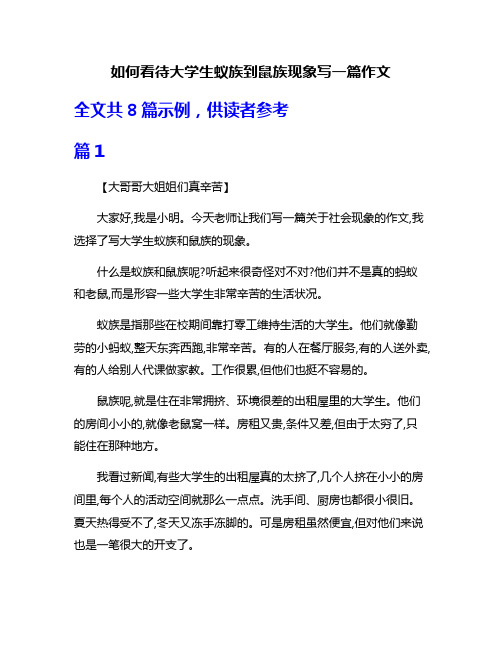
如何看待大学生蚁族到鼠族现象写一篇作文全文共8篇示例,供读者参考篇1【大哥哥大姐姐们真辛苦】大家好,我是小明。
今天老师让我们写一篇关于社会现象的作文,我选择了写大学生蚁族和鼠族的现象。
什么是蚁族和鼠族呢?听起来很奇怪对不对?他们并不是真的蚂蚁和老鼠,而是形容一些大学生非常辛苦的生活状况。
蚁族是指那些在校期间靠打零工维持生活的大学生。
他们就像勤劳的小蚂蚁,整天东奔西跑,非常辛苦。
有的人在餐厅服务,有的人送外卖,有的人给别人代课做家教。
工作很累,但他们也挺不容易的。
鼠族呢,就是住在非常拥挤、环境很差的出租屋里的大学生。
他们的房间小小的,就像老鼠窝一样。
房租又贵,条件又差,但由于太穷了,只能住在那种地方。
我看过新闻,有些大学生的出租屋真的太挤了,几个人挤在小小的房间里,每个人的活动空间就那么一点点。
洗手间、厨房也都很小很旧。
夏天热得受不了,冬天又冻手冻脚的。
可是房租虽然便宜,但对他们来说也是一笔很大的开支了。
为什么会有这些蚁族和鼠族的大学生呢?主要是因为他们家里太穷了,父母供不起他们上大学的费用。
有些人父母还欠了外债,家里更加拮据。
可是他们还是决心要上大学,将来走出贫穷的生活,所以就只能自己打工赚钱,靠自己的力量在校读书。
虽然生活非常辛苦,但大学生们并没有放弃梦想。
他们在课余时间还是会好好学习,保证成绩不会太差。
更了不起的是,有些已经工作的蚁族大学生下班后,还会利用深夜时间继续温习功课,真是太拼命了!大学生们为了完成学业,付出了太多的辛劳和汗水。
没有游手好闲,也没有贪玩,从早到晚,家和学校两点一线。
他们寄宿的出租房虽然小小的,环境也很差,但对他们来说已经是luxury了。
只要能安心读书,哪怕条件再差,也在所不辞。
看到这些打工的大学生,我真的很佩服他们。
虽然年纪小,但他们已经懂得了吃苦耐劳的道理。
我暗下决心,将来也要像他们一样刻苦读书,不虚度光阴。
更重要的是,我们每个人都要关注这些贫困大学生的困难处境,尽自己所能给予帮助和支持。
大学生蜗居蚁族鼠族的看法英语作文500字
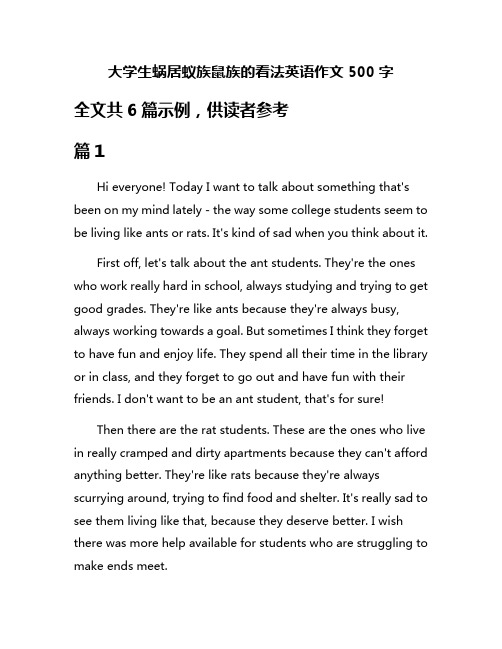
大学生蜗居蚁族鼠族的看法英语作文500字全文共6篇示例,供读者参考篇1Hi everyone! Today I want to talk about something that's been on my mind lately - the way some college students seem to be living like ants or rats. It's kind of sad when you think about it.First off, let's talk about the ant students. They're the ones who work really hard in school, always studying and trying to get good grades. They're like ants because they're always busy, always working towards a goal. But sometimes I think they forget to have fun and enjoy life. They spend all their time in the library or in class, and they forget to go out and have fun with their friends. I don't want to be an ant student, that's for sure!Then there are the rat students. These are the ones who live in really cramped and dirty apartments because they can't afford anything better. They're like rats because they're always scurrying around, trying to find food and shelter. It's really sad to see them living like that, because they deserve better. I wish there was more help available for students who are struggling to make ends meet.Overall, I think it's important for college students to find a balance between working hard and enjoying life. We shouldn't be like ants, working ourselves to the bone without taking time to relax and have fun. And we definitely shouldn't be like rats, living in squalor and struggling just to survive. Let's all try to find a better way to live, so we can enjoy our college years to the fullest. Thanks for listening!篇2Hi guys! Today I want to talk about something really important - the phenomenon of "ant tribe" and "rat tribe" in big cities in China.So, what are "ant tribe" and "rat tribe"? Well, "ant tribe" refers to college graduates who work in low-paying jobs and live in poor conditions, sharing small apartments with several people. On the other hand, "rat tribe" is a term for migrant workers who live in underground basement apartments in big cities.I think it's really sad that so many young people, who have worked so hard to get a college degree, end up living in such difficult situations. They deserve better opportunities and a chance to live a more comfortable life.I believe the government should do more to help these young people find better jobs and affordable housing. Education is supposed to be the key to a better future, so it's really unfair that so many college graduates are struggling to make ends meet.Overall, I think it's important for us to be aware of the challenges that young people face in today's society. We should support each other and work together to create a brighter future for everyone. Let's fight for a fairer and more equal society!That's all for now. Remember to always be kind and help those in need. Bye-bye!篇3Hey guys, have you ever heard of the words "ant tribe" and "rat tribe"? They are terms used to describe the living conditions of some college students in big cities in China. Let's talk about it!So, the "ant tribe" refers to the group of college graduates who live in cramped and low-rent apartments in big cities, often working part-time jobs and struggling to make ends meet. They are like ants, working hard every day just to survive.On the other hand, the "rat tribe" refers to the college graduates who live underground in basements and other substandard housing in order to save money. They are like rats, living in dark and cramped conditions just to save a few bucks.Both the "ant tribe" and the "rat tribe" are facing the harsh reality of high living costs and fierce competition in big cities. They are often overworked and underpaid, with little time or money to enjoy themselves.As a primary school student, it's hard for me to understand why these college students have to live in such poor conditions. I think they should be able to enjoy their youth and pursue their dreams without having to worry about where they will sleep or how they will pay the bills.In conclusion, the situation of the "ant tribe" and the "rat tribe" is a sad reflection of the harsh realities of modern life. I hope that one day, all college students will be able to live comfortably and chase their dreams without having to sacrifice their well-being. Let's work together to create a better future for everyone!篇4Hey guys! Today I want to talk about something that's been on my mind lately - the idea of college students living in small apartments and working low-paying jobs. Some people call them "ants" because they're constantly working and never seem to have any free time. Others call them "slugs" because they're always in their rooms, never going out and experiencing life. Personally, I think both of these labels are pretty harsh.First of all, being a college student is tough. We have to juggle classes, homework, and part-time jobs, all while trying to have some kind of social life. It's not easy, and sometimes we have to make sacrifices in order to pay our bills and stay in school. That's why I have a lot of respect for these students who are working so hard to better themselves.But on the other hand, I also understand the importance of taking a break and enjoying life. We're only young once, and we should take advantage of that. It's okay to relax and have fun sometimes, even if it means spending a little less time studying or working.In the end, I think it's all about finding a balance. We should work hard and strive for success, but we should also remember to take care of ourselves and enjoy the journey. So whetheryou're an ant, a slug, or something in between, just keep doing your best and don't be too hard on yourself. You're doing great!篇5Hey guys, have you heard about the topic of "" recently? It's a pretty hot topic and a lot of people are talking about it. So, what do you think about it?Some people say that "" is a bad thing because it means that young people are living in small, crowded apartments and working hard at low-paying jobs. They don't have much free time or money to do fun things like travel or go out with friends. It's like they're stuck in a rut and can't find a way out.On the other hand, some people think that "" is just a temporary situation. They believe that young people are working hard now so that they can have a better future later. They are saving money and gaining experience that will help them get a better job and live a more comfortable life in the future.Personally, I think that "" is a complicated issue. It's important for young people to work hard and save money, but it's also important for them to take care of themselves and have some fun. It's all about finding a balance between work and play.What do you guys think? Do you think "" is a good thing or a bad thing? Let me know in the comments below!篇6As a primary school student, I am going to share my thoughts on the phenomenon of "ant tribe" and "rat tribe" among college students in a more casual and simplified way.So, the "ant tribe" refers to college graduates who live in small, cramped apartments in big cities and struggle to make ends meet. They often work long hours in low-paying jobs and face fierce competition in the job market. On the other hand, the "rat tribe" describes young people who live in basements or substandard housing because they cannot afford better accommodation.As a kid, I think it's really sad that so many college students have to live in such difficult conditions after graduation. I believe education is important, but it's not fair that young people have to suffer like this just to get a degree. It makes me wonder if there is something wrong with our society that forces so many people to live in poverty and hardship.I hope that in the future, all college students will have the opportunity to live in comfortable homes and find fulfilling jobsthat pay well. I think we need to work together to create a better world where everyone has a chance to succeed and live a happy life. Let's support each other and make a difference for the future generations. Thank you.。
大学生生存现状从蜗居蚁族到鼠族的英语作文
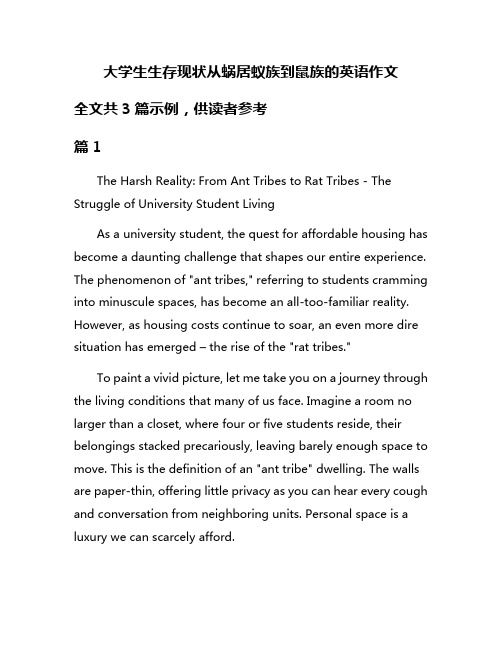
大学生生存现状从蜗居蚁族到鼠族的英语作文全文共3篇示例,供读者参考篇1The Harsh Reality: From Ant Tribes to Rat Tribes - The Struggle of University Student LivingAs a university student, the quest for affordable housing has become a daunting challenge that shapes our entire experience. The phenomenon of "ant tribes," referring to students cramming into minuscule spaces, has become an all-too-familiar reality. However, as housing costs continue to soar, an even more dire situation has emerged – the rise of the "rat tribes."To paint a vivid picture, let me take you on a journey through the living conditions that many of us face. Imagine a room no larger than a closet, where four or five students reside, their belongings stacked precariously, leaving barely enough space to move. This is the definition of an "ant tribe" dwelling. The walls are paper-thin, offering little privacy as you can hear every cough and conversation from neighboring units. Personal space is a luxury we can scarcely afford.Yet, as dire as these circumstances may seem, there exists an even more harrowing reality – the "rat tribes." These are the students who, through sheer desperation or lack of options, resort to living in dilapidated buildings, abandoned factories, or even underground shelters. The conditions are unspeakably squalid, with crumbling infrastructure, limited ventilation, and a constant struggle against pests and disease.For many of us, the decision to join these "tribes" is not a choice but a necessity born out of financial constraints. The soaring costs of rent, coupled with the pressure of tuition fees and daily expenses, have made conventional housing options virtually inaccessible. We are forced to sacrifice our comfort, privacy, and dignity in pursuit of an education that promises a better future.The psychological toll of living in such conditions is immense. Constant noise, lack of personal space, and the ever-present fear of eviction or displacement weigh heavily on our minds. Studying becomes a Herculean task, as the cramped and chaotic environment is far from conducive to academic focus. Maintaining hygiene and basic living standards is an ongoing battle, further exacerbating the stress and strain.Moreover, the social implications of this lifestyle are profound. Forming meaningful relationships becomes challenging when personal boundaries are constantly violated, and privacy is a luxury few can afford. Loneliness and isolation often become unwelcome companions, as we struggle to maintain a sense of normalcy amidst the chaos.Despite these adversities, we persevere, driven by the hope that our sacrifices today will pave the way for a brighter tomorrow. We cling to the belief that education is the key to breaking free from the cycle of poverty and creating a better life for ourselves and our families. Each day is a battle, but we fight on, fueled by determination and the unwavering dream of a better future.It is a sobering reality that in a society as advanced as ours, such living conditions persist. The "ant tribes" and "rat tribes" are not mere statistics or abstract concepts; they are a reflection of the deep-rooted inequalities and systemic failures that continue to plague our education system and housing market.As students, we call upon the authorities and policymakers to prioritize affordable housing initiatives and address the root causes of this crisis. We implore them to recognize that access to decent living conditions is not a luxury but a fundamental right,inextricably linked to our ability to pursue education and unlock our full potential.Furthermore, we urge our fellow citizens to acknowledge the plight of the "ant tribes" and "rat tribes," and to embrace a spirit of compassion and understanding. These are not mere housing issues but human issues that touch upon the very fabric of our society and the principles of equality and dignity we claim to uphold.In closing, the living conditions of university students, from "ant tribes" to "rat tribes," serve as a stark reminder of the challenges we face and the work that lies ahead. It is a call to action, a rallying cry for change and reform. For it is only through collective effort and a unwavering commitment to justice that we can dismantle the barriers that stand between us and a future where every student has access to safe, affordable, and dignified housing – a future where the very concepts of "ant tribes" and "rat tribes" are consigned to the annals of history, replaced by a society that truly values and nurtures its youth.篇2The Harsh Reality: From Ant Tribes to Rat Tribes, the Plight of University Students' Living ConditionsAs a university student, the excitement of embarking on this new chapter of life is often overshadowed by the daunting challenge of finding affordable and decent housing. The housing crisis on campuses has become a harsh reality that many of us face, forcing us to navigate through a maze of compromises and adaptations. From the overcrowded "ant tribes" to the subterranean existence of "rat tribes," the living conditions we endure paint a grim picture of the struggles faced by today's scholars.The Rise of the Ant TribesThe term "ant tribe" has become a familiar one on university campuses, referring to the growing number of students who inhabit tiny, cramped spaces not originally intended for living quarters. These spaces, often no larger than a few square meters, are carved out of basements, attics, or even shared with multiple roommates in a single room. Privacy is a luxury that many of us have had to sacrifice, as we navigate through makeshift partitions or curtains that barely provide a semblance of personal space.Living in these ant-like conditions is not just a matter of discomfort; it's a constant battle against the elements. Poor ventilation, inadequate lighting, and the lack of basic amenitieslike cooking facilities or bathrooms make daily life a constant struggle. The mental toll of living in such confined spaces can be overwhelming, as the lines between studying, relaxing, and sleeping become increasingly blurred.The Descent into the Rat TribesFor those who find even the ant tribes too expensive or inaccessible, the harsh reality of the "rat tribes" awaits. These are the students who have been forced to seek refuge in underground spaces, such as basements, underground parking garages, or even abandoned bomb shelters. The irony of pursuing higher education while living in conditions more suited for vermin is not lost on us.The rat tribes face a whole new set of challenges beyond the cramped spaces of the ant tribes. Dampness, mold, and the ever-present risk of flooding are constant concerns, not to mention the potential health hazards of living in such unsanitary environments. Privacy is virtually non-existent, as the echoes of footsteps and voices from above serve as a constant reminder of the world beyond our subterranean dwellings.The Financial Burden and Mental TollWhile the physical living conditions of the ant and rat tribes are undoubtedly challenging, the financial burden and mental toll they impose on students cannot be ignored. For many of us, the decision to live in such conditions is not a choice but a necessity driven by the ever-rising costs of education and the scarcity of affordable housing options.The financial strain of paying rent, tuition fees, and other living expenses can be overwhelming, often forcing us to take on multiple part-time jobs or rely on family support. The constant juggling of academic responsibilities and financial obligations can lead to burnout, anxiety, and a general sense of hopelessness.The mental toll of living in these conditions cannot be understated. The lack of personal space, privacy, and basic amenities can take a significant toll on our well-being, making it difficult to focus on our studies and maintain a healthy work-life balance. The constant stress and uncertainty can lead to mental health issues, such as depression and anxiety, which can further exacerbate the challenges we face.A Call for ChangeWhile the reality of the ant and rat tribes is a harsh one, it is a symptom of a larger issue – the lack of affordable and qualityhousing options for university students. As future leaders and contributors to society, it is imperative that we address this issue head-on and demand change.Universities and government authorities must prioritize the development of affordable and suitable housing options for students. This could involve partnerships with private developers, the construction of on-campus dormitories, or the implementation of rent-control measures to ensure that housing remains within reach for those pursuing higher education.Furthermore, we must challenge the stigma and misconceptions surrounding the living conditions of the ant and rat tribes. These are not merely "student lifestyles" or "rites of passage"; they are unacceptable living conditions that no individual should be forced to endure, let alone those striving to better themselves through education.In conclusion, the plight of the ant and rat tribes is a stark reminder of the challenges faced by university students in today's world. While we may have chosen to pursue higher education in the hopes of securing a better future, the harsh reality of our living conditions often overshadows that dream. It is time for us to raise our voices and demand change, for the sake of our well-being, our education, and our future. We are notmere ants or rats; we are the future leaders, innovators, and changemakers, and we deserve better.篇3The Harsh Reality of Student Living: From Ant Tribes to Mouse TribesAs a college student trying to make it in the big city, the struggle to find affordable housing is all too real. My journey has taken me from the cramped confines of an "ant tribe" apartment to the precarious existence of a "mouse tribe" renter, and let me tell you, it hasn't been an easy ride.When I first arrived in the city, wide-eyed and full of hopes and dreams, I quickly learned that finding a decent place to live on a student's budget was no easy feat. That's when I stumbled upon the world of the "ant tribe" – a term used to describe the legions of young people forced to live in tiny, subdivided apartments, often no bigger than a parking space.My first ant tribe abode was a shoebox of a room, barely big enough to fit a single bed and a small desk. The communal bathroom and kitchen were shared with a dozen other tenants, all of us crammed together like, well, ants in a colony. Privacy was a luxury I could barely afford, let alone dream of.Despite the less-than-ideal living conditions, I tried to make the best of it. After all, I was in the city, chasing my dreams, and a little discomfort seemed like a small price to pay. But as the months wore on, the cracks in the ant tribe lifestyle began to show.The constant noise from my neighbors, the never-ending battle for bathroom time, and the lack of personal space took its toll. I found myself longing for a place to call my own, a sanctuary where I could escape the chaos of student life.That's when I discovered the "mouse tribe" – a group of resourceful souls who had figured out a way to live independently, albeit in unconventional ways. These were the students who had taken up residence in basements, attics, and even converted storage units, anything to avoid the ant tribe existence.Determined to join their ranks, I scoured the city for my own mouse hole, eventually settling on a tiny basement studio that could charitably be described as cozy. Sure, the ceiling was low, and the only natural light came from a tiny window at ground level, but it was mine, and that was all that mattered.Of course, being a mouse tribe member came with its own set of challenges. The lack of proper insulation meant my littlehaven was either an oven in the summer or an ice box in the winter. And let's not even talk about the occasional uninvited guests – rodents of the four-legged variety who seemed to think they had as much claim to the space as I did.But through it all, I persevered, because that's what us students do. We scrimp and save, we make sacrifices, and we find ways to survive, even when the odds seem stacked against us.As I look back on my time as an ant tribe dweller and a mouse tribe squatter, I can't help but feel a sense of pride. These experiences have taught me resilience, resourcefulness, and the true value of a place to call home, no matter how humble.To my fellow students still struggling to find their footing in the housing market, I say this: embrace the journey, for it is through these trials that we grow and learn what it truly means to be independent. Whether you're an ant, a mouse, or something in between, never lose sight of your dreams, and never stop fighting for a better tomorrow.After all, if we can survive the ant tribe and the mouse tribe, we can survive just about anything life throws our way.。
da大学毕业生向城市变蚁族英文作文
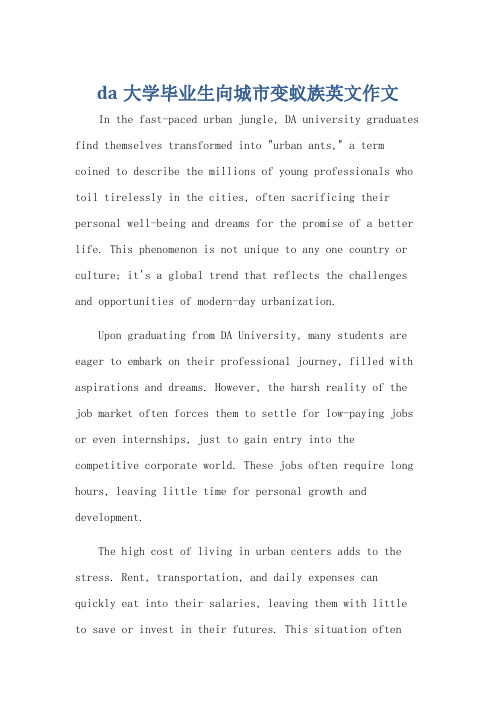
da大学毕业生向城市变蚁族英文作文In the fast-paced urban jungle, DA university graduates find themselves transformed into "urban ants," a term coined to describe the millions of young professionals who toil tirelessly in the cities, often sacrificing their personal well-being and dreams for the promise of a better life. This phenomenon is not unique to any one country or culture; it's a global trend that reflects the challenges and opportunities of modern-day urbanization.Upon graduating from DA University, many students are eager to embark on their professional journey, filled with aspirations and dreams. However, the harsh reality of the job market often forces them to settle for low-paying jobs or even internships, just to gain entry into the competitive corporate world. These jobs often require long hours, leaving little time for personal growth and development.The high cost of living in urban centers adds to the stress. Rent, transportation, and daily expenses canquickly eat into their salaries, leaving them with little to save or invest in their futures. This situation oftenleads to a sense of helplessness and despair, as they feel trapped in a vicious cycle of working hard but nevergetting ahead.To make ends meet, many DA graduates are forced to take on multiple jobs or engage in freelance work, further fragmenting their time and energy. This constant hustle and bustle leaves them with little time for socializing, let alone pursuing their hobbies or interests.The transition from college student to urban ant is not easy. It requires a significant adjustment in mindset and lifestyle. However, it's important to remember that this phase is temporary, and with hard work and perseverance, graduates can eventually find their footing in the urban landscape.In conclusion, while the transition from DA University graduate to urban ant may be challenging, it's also an opportunity for growth and self-discovery. By maintaining a positive attitude, setting realistic goals, andprioritizing their well-being, graduates can navigate this new phase of their lives and emerge stronger and more resilient.**大学毕业生向城市变蚁族**在节奏快速的都市丛林中,DA大学的毕业生发现自己变成了“都市蚁族”,这个词用来形容数百万的年轻专业人士,他们在城市中不懈地劳作,常常为了更美好生活的承诺而牺牲自己的个人福祉和梦想。
《蚁族:大学毕业生聚居村实录》读书笔记模板

读书笔记模板
01 思维导图
03 读书笔记 05 精彩摘录
目录
02 内容摘要 04 目录分析 06 作者介绍
思维导图
本书关键字分析思维导图
结合部
网络
蚁族大学
毕业生
群体
城乡
弱势群体
平均年龄
蚁族
课题组
特征
加盟
聚居村
唐家岭 状况 村
城市
心理
夹层
内容摘要
“蚁族”,是对“高校毕业生低收入聚居群体”的典型概括。该群体高知、弱小、聚居,是继三大弱势群体 (农民、农民工、下岗职工)之后的第四大弱势群体:他们受过高等教育,主要从事保险推销、电子器材销售、 广告营销、餐饮服务等临时性工作,有的甚至处于失业半失业状态;他们平均月收入低于两千元,绝大多数没有 “三险”和劳动合同;他们平均年龄集中在22—29岁之间,九成属于“80后”一代;他们主要聚居于城乡结合部 或近郊农村,形成独特的“聚居村”。他们是有如蚂蚁般的“弱小强者”,他们是鲜为人知的庞大群体。
精彩摘录
这是《蚁族:大学毕业生聚居村实录》的读书笔记模板,可以替换为自己的精彩内容摘录。
作者介绍
这是《蚁族:大学毕业生聚居村实录》的读书笔记模板,暂无该书作者的介绍。
谢谢观看
读书笔记
严肃文学,得花时间,得有资料资料写调研,想一起写部蘑菇族86后的纪实文学,希望你的加入hylhyl。 在这个世界上,多少沉默者在历史长河中如过隙白驹。 书中太多东西过于主观臆测的理想化,和观察者也是大学生的关系很大,全篇大部分在描述城中村的破败, 天之骄子的困惑、劳苦或是尚存的希望,却没有触及产生这类社会现象的思考。 看这些80后的奋斗故事,令人感慨。 花了好长时间才读完这本书,断断续续的,可是却不想放弃。 写得还是社会的一个侧面,描述了“蚁族”生活的现实状况,他们聚居在大城市的某个角落,有着对未来生 活的期盼,虽然聚居的生活不尽人意。 这本书的主编廉思是对外经贸大学公共管理学院的老师,也曾经教授过我一门课程。离开了这些聚居村,蚁 族还能走向哪里?是进入地下室成为鼠族还是回到曾经离开的家乡重新开始?又或是继续在城中村心怀梦想。
“蚁族”的奋斗
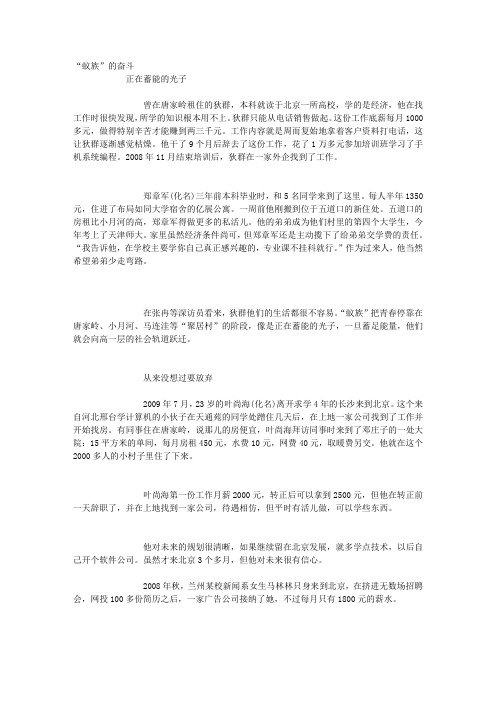
“蚁族”的奋斗正在蓄能的光子曾在唐家岭租住的狄群,本科就读于北京一所高校,学的是经济,他在找工作时很快发现,所学的知识根本用不上。
狄群只能从电话销售做起。
这份工作底薪每月1000多元,做得特别辛苦才能赚到两三千元。
工作内容就是周而复始地拿着客户资料打电话,这让狄群逐渐感觉枯燥。
他干了9个月后辞去了这份工作,花了1万多元参加培训班学习了手机系统编程。
2008年11月结束培训后,狄群在一家外企找到了工作。
郑章军(化名)三年前本科毕业时,和5名同学来到了这里。
每人半年1350元,住进了布局如同大学宿舍的亿展公寓。
一周前他刚搬到位于五道口的新住处。
五道口的房租比小月河的高,郑章军得做更多的私活儿。
他的弟弟成为他们村里的第四个大学生,今年考上了天津师大。
家里虽然经济条件尚可,但郑章军还是主动揽下了给弟弟交学费的责任。
“我告诉他,在学校主要学你自己真正感兴趣的,专业课不挂科就行。
”作为过来人,他当然希望弟弟少走弯路。
在张冉等深访员看来,狄群他们的生活都很不容易。
“蚁族”把青春停靠在唐家岭、小月河、马连洼等“聚居村”的阶段,像是正在蓄能的光子,一旦蓄足能量,他们就会向高一层的社会轨道跃迁。
从来没想过要放弃2009年7月,23岁的叶尚海(化名)离开求学4年的长沙来到北京。
这个来自河北邢台学计算机的小伙子在天通苑的同学处蹭住几天后,在上地一家公司找到了工作并开始找房。
有同事住在唐家岭,说那儿的房便宜,叶尚海拜访同事时来到了邓庄子的一处大院:15平方米的单间,每月房租450元,水费10元,网费40元,取暖费另交。
他就在这个2000多人的小村子里住了下来。
叶尚海第一份工作月薪2000元,转正后可以拿到2500元,但他在转正前一天辞职了,并在上地找到一家公司,待遇相仿,但平时有活儿做,可以学些东西。
他对未来的规划很清晰,如果继续留在北京发展,就多学点技术,以后自己开个软件公司。
虽然才来北京3个多月,但他对未来很有信心。
蚁族

•
一本《蚁族――大学毕业生聚居村实录》让 北京海淀区西北旺镇唐家岭村成为蚁族居住的代 名词。唐家岭紧邻中关村,因为交通方便,房租 低廉,吸引了大量的大学 毕业生聚集,唐家岭 村因为“蚁族”而被关注。该村户籍人口3000 多人,外来人口4万左右。 • 北京今年将启动改造城乡接合部的50个重点 村,唐家岭村是重点中的重点。唐家岭将于5月 开始启动拆迁,整体腾退工作将在今年12月31 日前完成,安置房及 多功能产业用地建设工作 将在2012年完成,其中多功能产业用地中10万 平方米用于公租房建设,但租金尚未公布。
• 本地人大都以出租房屋为生,为获利更多, 乱搭乱建现象十分严重,违规建筑是合法 建筑的5倍;楼房之间的过道狭窄,火灾隐 患突出;上班高峰期公共交通拥挤不堪。 唐家岭这一状况已引起北京市有关部门的 高度重视,已被列为整治督办重点村。
•
与现实生活中“蚁族”的庞大数量相比,在社会关 注度上,“蚁族”却是一个极少为人所知的群体。现 在社会上经常出现的是以“农民工、下岗职工、农民” 为主题的媒体报道和学术研究,而有关“蚁族”的学 术研究和媒体报道,都寥寥无几。在外来流动人口成 为新闻媒体和文学作品(特别是打工文学)关注的主 题,同时也日益成为学术界的主流话语和焦点时, “蚁族”却埋没于“青年农民工”、“流动人口”、 “校漂族”等字眼之下,他们既没有纳入政府、社会 组织的管理体制,也很少出现在学者、新闻记者的视 野之中。在某种程度上,这是一个被漠视和淡忘的群 体!这是一个少有人关注和同情的群体! • “蚁族”在主流话语中的缺失,并不代表他们在现实 生活中不重要! • 2010年,“蚁族”的主要聚居区——北京市唐家岭村 面临拆迁。大约5万唐家岭租客不得不另觅他处。
•
“蚁族”,并不是一种昆虫族群, 而是“80后”一个鲜为人知的庞大群 体——“大学毕业生低收入聚居群体”, 指的是毕业后无法找到工作或工作收入 很低而聚居在城乡结合部的大学生。这 些受过高等教育,却从事着保险推销、 电子器材销售、广告营销、餐饮服务等 临时性工作绝大多数没有“三险”和劳 动合同;月均收入低于2000元;年龄集 中在22岁至29岁之间。“蚁族”,是对 “大学毕业生低收入聚居群体”的典型 概括。他们是有如蚂蚁般的“弱小强 者”,他们是鲜为人知的庞大群体。
北漂“蚁族”(转载)
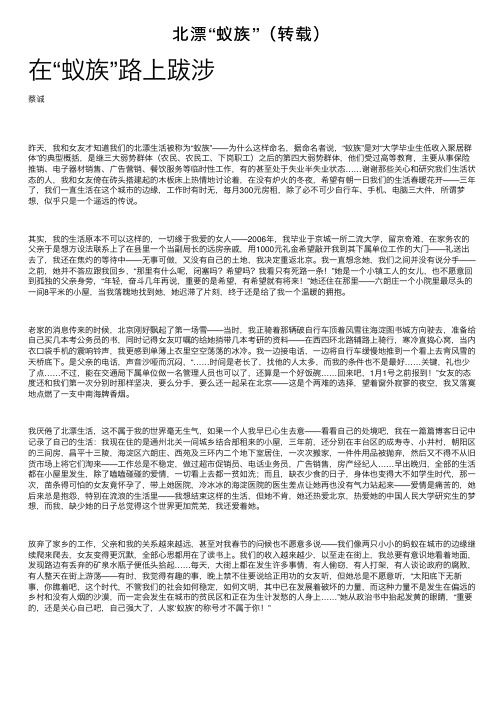
北漂“蚁族”(转载)在“蚁族”路上跋涉蔡诚昨天,我和⼥友才知道我们的北漂⽣活被称为“蚁族”——为什么这样命名,据命名者说,“蚁族”是对“⼤学毕业⽣低收⼊聚居群体”的典型概括,是继三⼤弱势群体(农民、农民⼯、下岗职⼯)之后的第四⼤弱势群体,他们受过⾼等教育,主要从事保险推销、电⼦器材销售、⼴告营销、餐饮服务等临时性⼯作,有的甚⾄处于失业半失业状态……谢谢那些关⼼和研究我们⽣活状态的⼈,我和⼥友倚在砖头搭建起的⽊板床上热情地讨论着,在没有炉⽕的冬夜,希望有朝⼀⽇我们的⽣活春暖花开——三年了,我们⼀直⽣活在这个城市的边缘,⼯作时有时⽆,每⽉300元房租,除了必不可少⾃⾏车、⼿机、电脑三⼤件,所谓梦想,似乎只是⼀个遥远的传说。
其实,我的⽣活原本不可以这样的,⼀切缘于我爱的⼥⼈——2006年,我毕业于京城⼀所⼆流⼤学,留京奇难,在家务农的⽗亲于是想⽅设法联系上了在县⾥⼀个当副局长的远房亲戚,⽤1000元礼⾦希望敲开我到其下属单位⼯作的⼤门——礼送出去了,我还在焦灼的等待中——⽆事可做,⼜没有⾃⼰的⼟地,我决定重返北京。
我⼀直想念她,我们之间并没有说分⼿——之前,她并不答应跟我回乡,“那⾥有什么呢,闭塞吗?希望吗?我看只有死路⼀条!”她是⼀个⼩镇⼯⼈的⼥⼉,也不愿意回到孤独的⽗亲⾝旁,“年轻,奋⽃⼏年再说,重要的是希望,有希望就有将来!”她还住在那⾥——六朗庄⼀个⼩院⾥最尽头的⼀间8平⽶的⼩屋,当我落魄地找到她,她迟滞了⽚刻,终于还是给了我⼀个温暖的拥抱。
⽼家的消息传来的时候,北京刚好飘起了第⼀场雪——当时,我正骑着那辆破⾃⾏车顶着风雪往海淀图书城⽅向驶去,准备给⾃⼰买⼏本考公务员的书,同时记得⼥友叮嘱的给她捎带⼏本考研的资料——在西四环北路辅路上骑⾏,寒冷直捣⼼窝,当内⾐⼝袋⼿机的震响铃声,我更感到单薄上⾐⾥空空荡荡的冰冷。
我⼀边接电话,⼀边将⾃⾏车缓慢地推到⼀个看上去背风雪的天桥底下。
是⽗亲的电话,声⾳沙哑⽽沉闷,“……时间是⽼长了,找他的⼈太多,⽽我的条件也不是最好……关键,礼也少了点……不过,能在交通局下属单位做⼀名管理⼈员也可以了,还算是⼀个好饭碗……回来吧,1⽉1号之前报到!”⼥友的态度还和我们第⼀次分别时那样坚决,要么分⼿,要么还⼀起呆在北京——这是个两难的选择,望着窗外寂寥的夜空,我⼜落寞地点燃了⼀⽀中南海牌⾹烟。
公务员考试申论例文蚁族
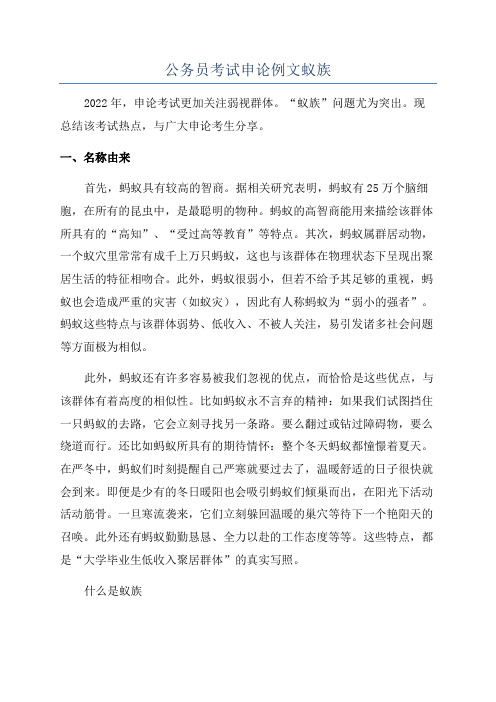
公务员考试申论例文蚁族2022年,申论考试更加关注弱视群体。
“蚁族”问题尤为突出。
现总结该考试热点,与广大申论考生分享。
一、名称由来首先,蚂蚁具有较高的智商。
据相关研究表明,蚂蚁有25万个脑细胞,在所有的昆虫中,是最聪明的物种。
蚂蚁的高智商能用来描绘该群体所具有的“高知”、“受过高等教育”等特点。
其次,蚂蚁属群居动物,一个蚁穴里常常有成千上万只蚂蚁,这也与该群体在物理状态下呈现出聚居生活的特征相吻合。
此外,蚂蚁很弱小,但若不给予其足够的重视,蚂蚁也会造成严重的灾害(如蚁灾),因此有人称蚂蚁为“弱小的强者”。
蚂蚁这些特点与该群体弱势、低收入、不被人关注,易引发诸多社会问题等方面极为相似。
此外,蚂蚁还有许多容易被我们忽视的优点,而恰恰是这些优点,与该群体有着高度的相似性。
比如蚂蚁永不言弃的精神:如果我们试图挡住一只蚂蚁的去路,它会立刻寻找另一条路。
要么翻过或钻过障碍物,要么绕道而行。
还比如蚂蚁所具有的期待情怀:整个冬天蚂蚁都憧憬着夏天。
在严冬中,蚂蚁们时刻提醒自己严寒就要过去了,温暖舒适的日子很快就会到来。
即便是少有的冬日暖阳也会吸引蚂蚁们倾巢而出,在阳光下活动活动筋骨。
一旦寒流袭来,它们立刻躲回温暖的巢穴等待下一个艳阳天的召唤。
此外还有蚂蚁勤勤恳恳、全力以赴的工作态度等等。
这些特点,都是“大学毕业生低收入聚居群体”的真实写照。
什么是蚁族“蚁族”,是指“大学毕业生低收入聚居群体”。
廉思日前在北京接受本报记者采访时介绍说,这些受过高等教育,却从事着保险推销、电子器材销售、广告营销、餐饮服务等临时性工作的大学毕业生们,主要居住在城乡接合部或近郊农村;绝大多数没有“三险”和劳动合同;月均收入低于2000元;年龄集中在22岁至29岁之间。
他们中有九成人是童年时曾被称为家中“小太阳”“小皇帝”的“80后”。
二、研究调查根据对北京、上海、广州、武汉和西安等城市研究调查显示,每个城市的蚁族聚居的人群数量都相当惊人。
郑州大学毕业生的蚁族生活劳碌奔波中寻求改变

□记者魏浩⽂洪波图 他们受过⾼等教育,却从事保险推销、⼴告营销、餐饮服务等临时性⼯作;平均⽉收⼊不⾜2000元或更低,绝⼤多数没有“三险”和劳动合同;他们聚居在都市村庄或近郊农村,多数属于“80后”、“90后”。
他们,就是近来被社会各界关注并引起政府部门重视的“⾼校毕业⽣低收⼊聚居群体”,被学者称之为“蚁族”。
郑州“蚁族”的⽣存状况如何?本报记者上周就此进⾏了⾛访。
四个男⽣的合租⽣活 在郑州市⼤学路、⽂化路、航海路以及北环附近的都市村庄⾥,居住着很多刚毕业的⼤学⽣。
毕业后,他们不能再住学校宿舍,因为习惯了学校周围的⽣活环境,多数留在郑州的毕业⽣选择了靠近⾼校、房租相对便宜的都市村庄居住。
在⼤学路北段,今年毕业的⼩伟和三个同学⼀块⼉,共同租下⼀套不⾜50平⽅⽶的民房。
两室⼀厅的屋⼦,被他们合理分开:⼩伟和⼀个同学住⼤卧室,另两个同学分别住⼩卧室和厨房。
四⼈分担的每季度1000元的房租,今年国庆后,被房东提⾼到了1200元。
由于房东只能提供3张单⼈床,⼏个年轻⼈借了⼀辆脚蹬三轮车,从家具市场买回⼀张⽊床,顺便还捎回两个沙发。
“⼀个沙发15元,看着还挺结实。
”⼩伟说,他们⾃⼰费劲将床和沙发抬进了5楼的房间。
“刚从学校出来时,我们天天在楼下市场上买饭吃。
后来觉得开⽀有点⼤,就想法⾃⼰做饭了。
”为此,⾯积狭⼩的客厅,被他们改成了厨房。
两⼝锅,租来的煤⽓灶和煤⽓罐,加上破旧凳⼦上被竖起的砧板,帮他们解决了吃饭问题。
⼩伟说,因为客厅没有位置,做好饭后,⼤家就端着碗坐床上吃,有时会把被褥卷起来,床板铺上报纸后当餐桌。
房间⾥没有⾐柜,四个男⽣把平时的⾐服放在床头,剩下的换洗⾐物则装进拉杆箱塞到床下。
4个男⽣分别毕业于两所⾼校。
因为同学关系,他们暂时聚集在了这间⾯积并不⼤,但还算热闹的屋⼦⾥。
“上⾼中、⼤学,早已经习惯⼀群⼈住在⼀块⼉。
或许我们就是典型的群居动物吧。
”⼩伟的同学晓峰调侃道。
毕业了却不愿回⽼家 ⼩伟今年24岁,是附近⼀所⼤学的本科毕业⽣。
- 1、下载文档前请自行甄别文档内容的完整性,平台不提供额外的编辑、内容补充、找答案等附加服务。
- 2、"仅部分预览"的文档,不可在线预览部分如存在完整性等问题,可反馈申请退款(可完整预览的文档不适用该条件!)。
- 3、如文档侵犯您的权益,请联系客服反馈,我们会尽快为您处理(人工客服工作时间:9:00-18:30)。
本文部分内容来自网络整理所得,本司不为其真实性负责,如有异议或侵权请及时联系,本司将立即予以删除!
== 本文为word格式,下载后可方便编辑修改文字! ==
毕业生沦为“蚁族”的全过程
毕业之后才发现,校园爱情不堪一击;毕业之后才发现,理想与现实总是很遥远……“我曾经豪情万丈,归来却空空的行囊。
”在大学校园里,他们是学生
干部,每年拿奖学金,离开校园,他们求职屡屡受挫,吃快餐、租张床,像蚂
蚁一样生活着。
毕业了,梦想却照不进现实。
6月底,记者在市内各大求职公
寓采访发现,目前正是求职公寓的旺季,床位供不应求,而租床的八成来自应届毕业生。
毕业了,他们却成为蚁族。
昨日,记者在观音桥附近的一家求职公寓看到,公寓由两套三室一厅组成,分为男生寝室和女生寝室。
其中还细分为8人间、6人间和4人间,厕所和厨
房公用。
目前,公寓已经住满了人,大部分都是在主城求职的应届毕业生,其中还包括在单位实习的。
“每年这个时候,都是求职公寓的旺季。
”开办求职
公寓已经3年的吴女士称,租张床位的价格是每月300元,包水电,包上网。
对求职的毕业生来说,这已经算很便宜的了。
南坪、石桥铺等地的求职公寓负责人称,因为价格便宜,毕业生大多选择
在实习和求职期间入住。
目前,公寓的入住率都在八成以上。
时间:大学期间状态:在云端
学生会干部
常有奖学金
201X年,17岁的巫山姑娘陈青以优异的成绩考入江苏大学,开始了她梦
寐以求的大学之旅。
“只要努力读书,在城市找到一份工作,就能彻底走出大
山。
”从那时候开始,留在城市生活就成为她的唯一梦想。
大学期间,陈青在
同学中虽说不算最聪明的,但是凭着刻苦,成绩一直在中上。
大学四年,她不
仅在学生会担任学生干部,还多次获得奖学金。
被无数光环笼罩的陈青大学期间一直有着强烈的优越感,“工作或许会很
难找,但是成绩优秀应该会占先机。
”虽然有些危机感,但是成绩优秀的陈青
对自己还是很有信心。
时间:离毕业半年状态:梦破了
兴冲冲应聘银行
被拒绝
201X年,陈青进入大四,同学们都开始实习找工作,她也不例外。
陈青
毕业就回到重庆,金融专业出身的她最希望进入银行工作,因此她很留意这方
面的招聘。
201X年12月,重庆一家银行面向社会公开招聘,“招聘条件我全部符合,最主要的是专业对口。
”陈青很兴奋,第一次求职,她认真地填写了简历和报名表,并附上自己通过的英语和计算机等级证书副本,以及自己获得的一
些奖状证书。
陈青当时满怀希望,认为至少可以进入到面试环节。
但一个月之后,陈青上网发现,银行列出的参加笔试人员的名单中,没有自己的名字。
时间:离毕业4月状态:慌张了
两月寄出百份简历
没回复
这件事给了陈青很大的打击,不过她只要发现还有银行招聘,都积极应聘。
只是从来都没进入到笔试环节。
慢慢的,陈青的心理发生了变化。
“我把目标
逐渐降低。
”陈青说,后来在网上投简历的时候,她便不那么看重单位,只要
觉得自己能够胜任,都投了简历。
在今年春节前,陈青很多同学都找到了工作,她开始着急了。
“到后来我投的简历多得已经自己都数不清了。
”陈青估计了
一下,两个月寄出的100多份简历,没几个回复电话。
今年在老家过完春节,陈青独自一人回到重庆主城,身上的钱已经所剩无几。
她后来住进了观音桥一
家求职公寓。
这里大多都是应届毕业生,也是去找工作的。
在这个月里,陈青每天都打扮得光鲜靓丽,到人才市场投简历面试。
可是令她寒心的是,大部分
简历都石沉大海,偶尔招她去面试的也是业务员之类的工作,这和陈青的期望
相差甚远。
为了节约费用,陈青回到学校等待毕业。
时间:毕业后状态:做蚁族
住求职公寓
买打折菜吃鸡蛋面
6月21日,陈青拿到大学毕业证,从学校返回重庆,再次住进她熟悉的求职公寓,继续求职之路。
“虽然也是住的上下铺,但和学校完全不同”,陈青
无奈地摇摇头。
6月24日晚上7点,记者在观音桥一家求职公寓见到了应届毕业生陈青,她正在弄晚饭,当天她的晚餐是鸡蛋挂面。
陈青早上8点起来就去人才市场转转,午睡之后在网上投简历。
她每天时间安排得很满。
晚上陈青还会去超市,“7点之后很多菜打折,这个时候去买可以省下不少钱。
”在求职公寓,陈青
租的是6人间的上铺,平时都坐在床上用笔记本上网。
一间厨房和一个卫生间
因为要和大家合用,所以陈青只能“错峰吃饭”、“错峰洗澡”。
相关新闻
“奖状证书似乎没用”
每年都拿奖学金,老师眼中的尖子生,重庆工商大学毕业的宋欣(化名)从
小到大都是父母的骄傲。
“一直都好好学习,想通过自己的努力,让父母过得
更好。
”来自铜梁农村的宋欣说完这句话,叹了口气。
上下铺床底的行李箱,
放着一叠奖状、证书,宋欣一本本翻给记者看,“但找工作的时候,似乎都没
什么用。
”
宋欣从去年12月住进了求职公寓,原本打算找到好点的工作,就换个环
境好的房子租,但宋欣在求职路上屡次碰壁。
“学的中文方面的专业,很难找
工作。
”按宋欣的话说,找工作容易,找到自己喜欢的工作难。
第一份工作,
宋欣是做销售,“每月700元底薪加提成。
”找了三四份工作,都是销售、文
员等,“工资都差不多,感觉也没有什么发展空间。
”每周末,只要有招聘会,宋欣都会去,“简历都投了100多份,希望可以找份工资高一点的工作。
”
为了省钱,宋欣每天上班都自己带饭吃,“晚上回家把第二天的饭做好,
第二天就带到单位热一下。
”宋欣介绍,自己一个星期最多花30多元菜钱。
考公务员、进事业单位,这是宋欣理想的工作,“走出学校后才发现,找工作
并不是单凭有能力有学历就可以的。
”
以下文字仅用于测试排版效果, 请使用时删除!
当撩开窗的刹那,当推开门楣的倥偬,当抬头仰望天空时刻,秋阳光芒,总是令你防不胜防,把它光和热,幻化成清晰影子,将你打得,招架难熬,只有默默承受,从早到晚,变为它之囚徒,渴望于之脱逃。
但它还是温情脉脉,一早一晚,总会搅起微凉,让一丝丝风儿,轻轻吹拂,漫过肌肤,沁入骨髓,透进心灵,将凉之感觉和寓趣,成为相伴你欣慰舒朗。
在艳阳的秋高气爽,正以闲情逸致放飞畅想,思绪飘零,以平生芳华,一颦一笑,走出蜗居,到大自然里,旅游行走,穿街过巷,沟过河,感受秋的五彩缤纷,树木,植被,丛林,蒿草,河流,山川,田园,……一切只要人能寻觅处所,均可潇洒而去,而非徒走过场。
